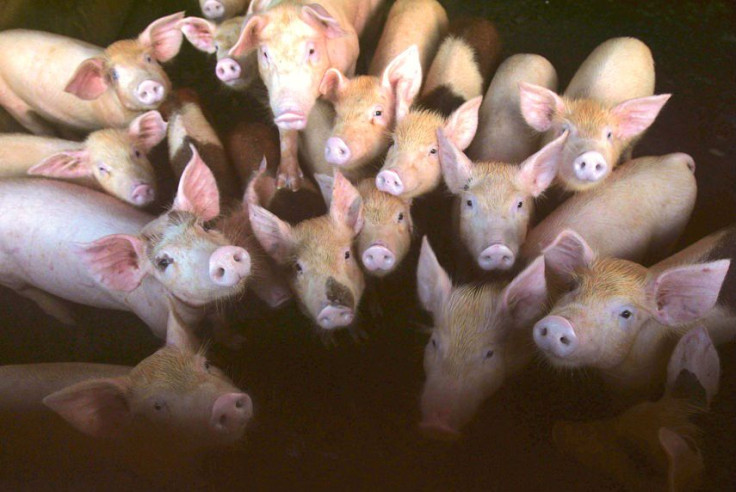Military Experiments Blew Explosives at Pigs and Infected Monkeys With Anthrax, Group Alleges

The British Union for the Abolition of Vivisection (BUAV) claims that the United Kingdom's and United States' military shot explosives at pigs, forced pigs to inhale mustard gas, and inflicted anthrax on monkeys in a damning report.
Porton Down is a military facility for the United Kingdom. The BUAV argues that these experiments were performed in the last two years, and that the experiments caused these animals a great deal of suffering.
The organization collected all of its information for the report from scientific journals, where researchers from Porton Down published their findings.
In a study published in the Annals of Surgery in 2010, 28 pigs were anaesthetized, wrapped in blankets, and placed on trolleys. Then explosives were detonated eight feet away from the animals.
The experiment left 11 of the 28 pigs dead. Many suffered a significant amount of blood loss, as well as injuries from the explosion.
During another experiment, pigs were forced to inhale chemical weapons, which included mustard gas and phosgene, both of which are extremely dangerous. The pigs developed severe lung damage and were later euthanized.
A different study conducted by the United States' Defense Advanced Research Projects Agency (DARPA) and published in the International Journal of Antimicrobial Agents last year infected marmoset monkeys with anthrax, the BUAV says. The monkeys were then given antibiotics. Four animals died during that experiment, and the remaining monkeys were put down at the end of the study.
The BUAV says that there is no indication that the monkeys were given painkillers of any kind and were likely in agony before their deaths.
Two other studies administered toxic nerve gas to guinea pigs and infected mice with the bacteria that leads to the bubonic plague.
"Although supporting the need to ensure the safety of soldiers and civilians in an increasingly dangerous world, the BUAV is opposed to deliberately causing suffering and death to animals in such disturbing and cruel experiments," Michelle Thew said to British news outlet The Independent. "We believe it is totally unacceptable to treat animals in this way."
While Porton Down is subject to Home Office regulations that seek to avoid unnecessary animal suffering, the United Kingdom's Animal Welfare Advisory Committee, which would have regulated the bureau, was closed in 2010.
The Defense Science and Technology Laboratory said in a statement, "DSTL operates in strict accordance with the Animals (Scientific Procedures) Act. All the research projects that involve animals are licensed by the Home Office. As part of the licensing process, the researchers have to convince the Home Office that the work is required, that the results cannot be obtained without the use of animals and that every step has been taken to [minimize] pain and suffering to the animals involved...The Home Office, their inspectors and their independent Animal Procedures Committee (APC) make both announced and unannounced visits several times a year to ensure compliance with these guidelines. The MoD's Animal Welfare Advisory Council (AWAC) was dissolved as it duplicated this work."



























